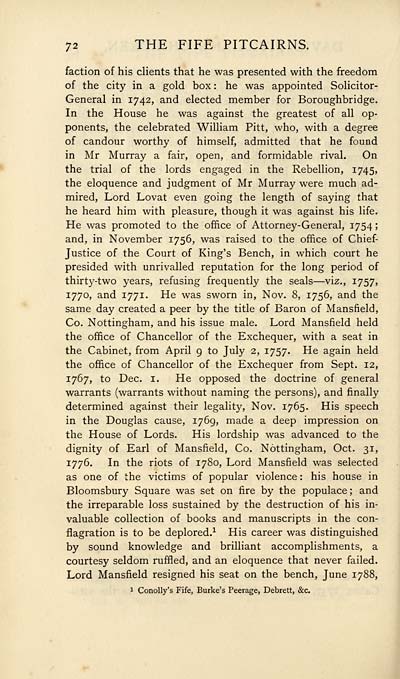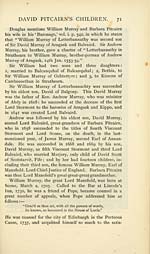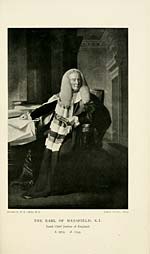History of the Fife Pitcairns
(104) Page 72
Download files
Complete book:
Individual page:
Thumbnail gallery: Grid view | List view

72 THE FIFE PITCAIRNS.
faction of his clients that he was presented with the freedom
of the city in a gold box : he was appointed Solicitor-
General in 1742, and elected member for Boroughbridge.
In the House he was against the greatest of all op-
ponents, the celebrated William Pitt, who, with a degree
of candour worthy of himself, admitted that he found
in Mr Murray a fair, open, and formidable rival. On
the trial of the lords engaged in the Rebellion, 1745,
the eloquence and judgment of Mr Murray were much ad-
mired, Lord Lovat even going the length of saying that
he heard him with pleasure, though it was against his life.
He was promoted to the office of Attorney-General, 1754 ;
and, in November 1756, was raised to the office of Chief-
Justice of the Court of King's Bench, in which court he
presided with unrivalled reputation for the long period of
thirty-two years, refusing frequently the seals — viz., 1757,
1770, and 1771. He was sworn in, Nov. 8, 1756, and the
same day created a peer by the title of Baron of Mansfield,
Co. Nottingham, and his issue male. Lord Mansfield held
the office of Chancellor of the Exchequer, with a seat in
the Cabinet, from April 9 to July 2, 1757. He again held
the office of Chancellor of the Exchequer from Sept. 12,
1767, to Dec. 1. He opposed the doctrine of general
warrants (warrants without naming the persons), and finally
determined against their legality, Nov. 1765. His speech
in the Douglas cause, 1769, made a deep impression on
the House of Lords. His lordship was advanced to the
dignity of Earl of Mansfield, Co. Nottingham, Oct. 31,
1776. In the riots of 1780, Lord Mansfield was selected
as one of the victims of popular violence : his house in
Bloomsbury Square was set on fire by the populace; and
the irreparable loss sustained by the destruction of his in-
valuable collection of books and manuscripts in the con-
flagration is to be deplored. 1 His career was distinguished
by sound knowledge and brilliant accomplishments, a
courtesy seldom ruffled, and an eloquence that never failed.
Lord Mansfield resigned his seat on the bench, June 1788,
1 Conolly's Fife, Burke's Peerage, Debrett, &c.
faction of his clients that he was presented with the freedom
of the city in a gold box : he was appointed Solicitor-
General in 1742, and elected member for Boroughbridge.
In the House he was against the greatest of all op-
ponents, the celebrated William Pitt, who, with a degree
of candour worthy of himself, admitted that he found
in Mr Murray a fair, open, and formidable rival. On
the trial of the lords engaged in the Rebellion, 1745,
the eloquence and judgment of Mr Murray were much ad-
mired, Lord Lovat even going the length of saying that
he heard him with pleasure, though it was against his life.
He was promoted to the office of Attorney-General, 1754 ;
and, in November 1756, was raised to the office of Chief-
Justice of the Court of King's Bench, in which court he
presided with unrivalled reputation for the long period of
thirty-two years, refusing frequently the seals — viz., 1757,
1770, and 1771. He was sworn in, Nov. 8, 1756, and the
same day created a peer by the title of Baron of Mansfield,
Co. Nottingham, and his issue male. Lord Mansfield held
the office of Chancellor of the Exchequer, with a seat in
the Cabinet, from April 9 to July 2, 1757. He again held
the office of Chancellor of the Exchequer from Sept. 12,
1767, to Dec. 1. He opposed the doctrine of general
warrants (warrants without naming the persons), and finally
determined against their legality, Nov. 1765. His speech
in the Douglas cause, 1769, made a deep impression on
the House of Lords. His lordship was advanced to the
dignity of Earl of Mansfield, Co. Nottingham, Oct. 31,
1776. In the riots of 1780, Lord Mansfield was selected
as one of the victims of popular violence : his house in
Bloomsbury Square was set on fire by the populace; and
the irreparable loss sustained by the destruction of his in-
valuable collection of books and manuscripts in the con-
flagration is to be deplored. 1 His career was distinguished
by sound knowledge and brilliant accomplishments, a
courtesy seldom ruffled, and an eloquence that never failed.
Lord Mansfield resigned his seat on the bench, June 1788,
1 Conolly's Fife, Burke's Peerage, Debrett, &c.
Set display mode to:
![]() Universal Viewer |
Universal Viewer | ![]() Mirador |
Large image | Transcription
Mirador |
Large image | Transcription
Images and transcriptions on this page, including medium image downloads, may be used under the Creative Commons Attribution 4.0 International Licence unless otherwise stated. ![]()
| Histories of Scottish families > History of the Fife Pitcairns > (104) Page 72 |
|---|
| Permanent URL | https://digital.nls.uk/95716899 |
|---|
| Description | A selection of almost 400 printed items relating to the history of Scottish families, mostly dating from the 19th and early 20th centuries. Includes memoirs, genealogies and clan histories, with a few produced by emigrant families. The earliest family history goes back to AD 916. |
|---|

